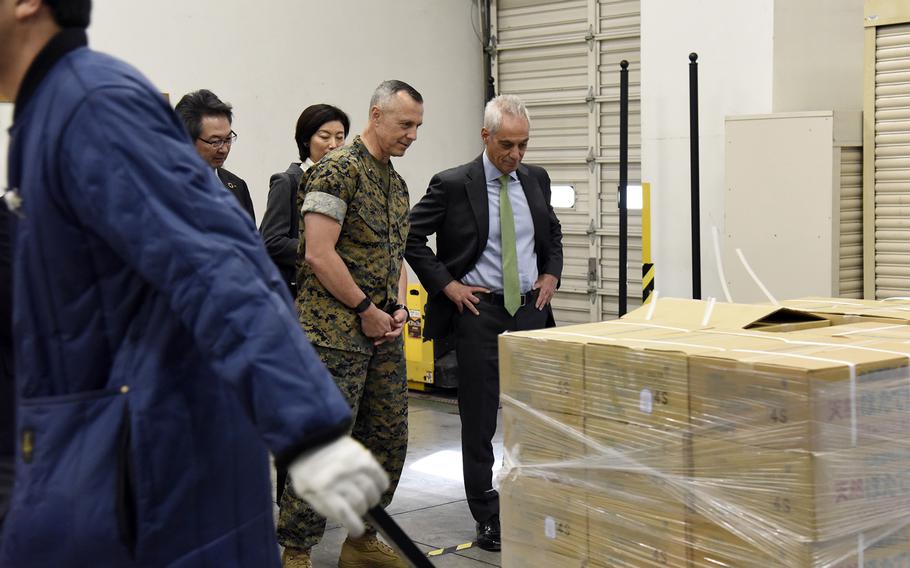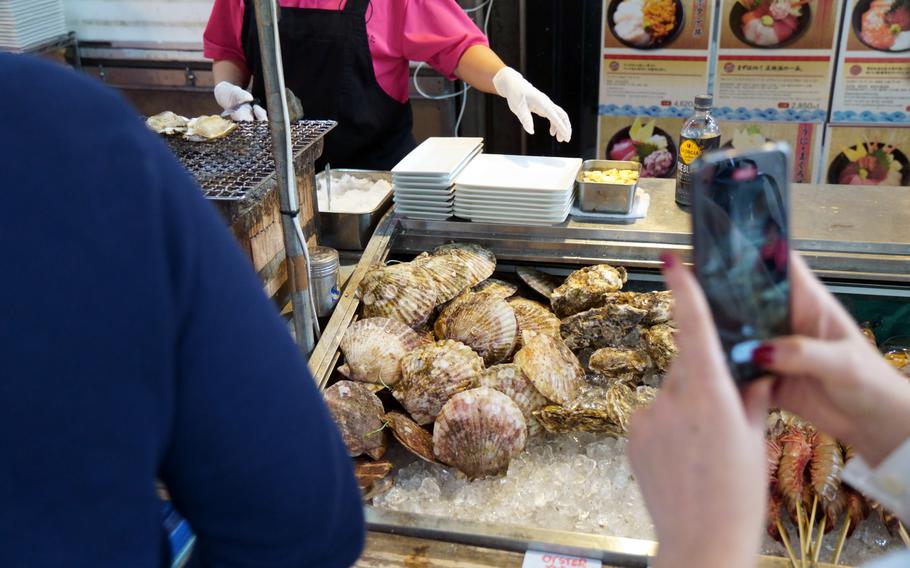Asia-Pacific
Japanese scallops, safety assurances are delivered to US military commissary in Tokyo
Stars and Stripes October 31, 2023

U.S. Ambassador to Japan Rahm Emanuel and Marine Corps Brig. Gen. George Rowell, deputy commander of U.S. Forces Japan, watch as Hokkaido scallops are delivered to the commissary at Yokota Air Base, Japan, Tuesday, Oct. 31, 2023. (Juan King/Stars and Stripes)
YOKOTA AIR BASE, Japan — The U.S. ambassador to Japan delivered a shipment of Hokkaido scallops, along with assurances that the country’s seafood is safe to eat, on Tuesday to a commissary where military families shop for groceries at this U.S. airlift hub in western Tokyo.
The staged delivery represents one part of a U.S. agreement to help Japan offset the loss of fresh fish sales to China by selling and consuming its seafood at U.S. military bases in Japan, U.S. Ambassador to Japan Rahm Emanuel said at the commissary.
“In America we have a saying about being a good neighbor,” he said. “This is being a good neighbor.”
The scallops delivery is the first of many to commissaries, naval vessels and other outlets serving U.S. service members, Defense Department personnel and their families, he said. He was joined at the commissary by representatives of Japan’s government, the Hokkaido Federation of Fisheries Cooperative Associations, the Defense Commissary Agency, base commander Air Force Col. Andrew Roddan and Marine Corps Brig. Gen. George B. Rowell, the deputy commander of U.S. Forces Japan.
China imposed a ban on imported Japanese seafood after Japan released water containing radioactive tritium from the damaged Fukushima Daiichi nuclear power plant on Aug. 24 and again on Oct. 5, according to news reports.
Emanuel said he serves Japanese seafood at his table.
“I’ve served the products to my own children; I continue to eat the products from the Fukushima area,” he said. “I’ve served the fish products to some of the highest elected officials in the United States government and armed forces, and we will continue to stand with our friends in Japan.”
Former U.S. House Speaker Kevin McCarthy is among those who dined with Emanuel on Japanese seafood, the ambassador said.
He said the seafood deal begins with scallops from Hokkaido, the northernmost of Japan’s four main islands, but eventually all types of fish will be sold in the commissaries at all 17 U.S. installations in Japan, at farmers markets on some U.S. bases and served on U.S. Navy ships.
Information on the cost for the U.S. to sell or provide Japanese seafood to the military stationed in Japan was unavailable from Defense Commissary Agency representatives Tuesday. Emanuel and the others appeared at a ribbon-cutting event at a seafood cooler inside the Yokota commissary to draw attention to the arrangement.

Scallops and other Japanese seafood is sold at Tsukiji outer market in Tokyo, Tuesday, Oct. 31, 2023. (Akifumi Ishikawa/Stars and Stripes)
Emanuel in September called the Chinese ban on Japanese seafood “economic coercion,” according to The Associated Press. On Tuesday, he said the ban had backfired.
“If the intent was to isolate Japan, you’ve isolated China,” he said.
Hokkaido was hard hit by the Chinese ban, according to The Japan Times on Sept. 22. Scallops have piled up in industry freezers there while seafood exports to China fell by nearly 70% in August compared to the previous year, the newspaper reported.
The March 2011 tsunami caused by a powerful earthquake off Japan’s northeastern coast inundated the Fukushima power plant and caused a meltdown of its nuclear cores. The plant is slated for decommissioning, of which the release of stored water is one step, according to the Reuters news agency.
The International Atomic Energy Agency has said the millions of tons of water, when released, would have negligible impacts on people and the environment. The water, which cooled nuclear fuel rods, has been treated and will require decades to be emptied from storage tanks, according to the IAEA.
The treatment system removes 62 types of radionuclides but cannot remove tritium, a radioactive form of hydrogen that cannot penetrate the skin but “may present a radiation hazard if inhaled or ingested but is only harmful to humans in very large doses,” according to the IAEA.
Environmental groups like Greenpeace argue the effects of releasing water from Fukushima need further study.
Stars and Stripes reporter Jonathan Snyder contributed to this report.